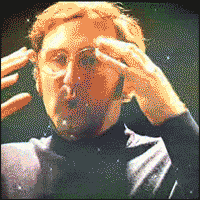Since I joined steem, I've very much enjoyed posts by @complexring, but I've seen very few others to really dive into a mathematical topic so I thought I share you some (simplified) notions about a mathematical subject that I'm very fond of! Infinity Theory deals with results that hold in the infinite. These are results that are very difficult to comprehend, but nevertheless they form the backbone of virtually all the statistics that most people encounter. Maybe someday, if steem grows and we gather a large community of academia and enthusiasts, I might be here to share you some of the important results, but today I'll start introducing the notion of infinity, albeit in a simplified anecdotical way.
Two things are infinite: the universe and human stupidity; and I'm not sure about the universe.
That's Einstein. He was a great mathematician, and like me he was keen on the concept of infinity. In 1917 he proposed in his paper Cosmological Considerations in the General Theory of Relativity that the universe could be finite in space and infinite in time.
We all know that the universe is big but apparently it's larger in time
That's a weird thing to think about. How can we compare spatial units with time units? Mathematicians are less concerned with actually understanding something. We just write down the equations and make it work. My math professors once told me that a good mathematician can proof anything, and that the best mathematicians understand a few proofs really well. In other words, the real challenge we face is to actually understand the things we prove.
So let's try to understand a little bit more about infinity
Infinity is a difficult concept. We can imagine large numbers. We have ten fingers, and it's not so difficult to extend that notion to larger numbers, say a thousand or a million. A million is already hard to comprehend, though we all know that some people have more than a million dollars on their bank.

this guy is probably a millionaire
So what about a really big number? Googolplex is the number 10^googol, or equivalently, 1010100, so big that if you would write it out in full, it would take all the space available in the universe and you wouldn't be finished. But that's not infinity. The only thing we can really say about infinity, is that it is something without any bound, it is larger than any number. It is unimaginably large!
Some infinities are bigger than others
Well that's weird. We can't even imagine infinity, but apparently there are multiple types of infinity and some are bigger that others. This is something that one can only state mathematically, it's very difficult to really understand why these things happen. In fact, I'm referring to a Hypothesis of Cantor, and it's actually not proven tough most mathematicians would agree it to be a very reasonable statement at the least. The hypothesis states that there are infinite round numbers, and infinite digit numbers, though there are more infinity of the latter.
There is some intuition (though it is false guidance), the integers are a proper subset of the rational numbers, which themselves are a proper subset of the real numbers. Intuitively one might say that therefore there should be more rational numbers than integers, and more real numbers than rational numbers. However at the same time we started from the notion that all three are infinite. So that's paradoxical reasoning. Cantor's statement was that there are infinite integer numbers, like -10 and +10.000.000, but that you can always pick a number in the set of integers, like the googolplex number, and you can start counting from 0, and reach your picked number in a finite amount of time. The integers are countably infinite. However the real numbers, that is the collection of all digit numbers like Pi, are all so lengthy that you can not even go from the first to the next real number and finish counting in a finite amount of time. All the real numbers are endless, or infinitely lengthy (as of 2015 we know about 13.3 trillion digits, but we are not finished). The real numbers are therefore uncountably infinite, hence the collection of real numbers is larger than the countably infinite integers.

that's how my students look when they try to understand results relying on infinity theory
Now it get's weird
It turns out that if you follow this so called continuum hypothesis, it also holds that the collection of real numbers between 0 and 1, is evidently a subset of all the real numbers but at the same time the same size as the collection of all the real numbers. In fact, the collection of all the real numbers between any two integers are the same size independent of the integers chosen, and bigger than the collection of all integers, while all of them are infinitely large.

Mentioning the so called continuum hypothesis usually triggers very interesting talks. The kind of talks that you have in an elevator, and you forget which floor you we're going to, completely oblivious to any others that enter and leave the elevator because you are so immersed in conversation. I wasn't talking about myself, well maybe I did..
Disregarding whether you believe it to be true, the concept is intriguing, and it is safe to say that the human mind is not made to understand these notions very well.
About me
I studied geology, only to conclude that the problems in the field of research did not really intrigue me as much as they did as when I was a kid looking for dinosaur bones in the garden. I had many courses in economics, specifically about environmental aspects and resource management. After my degree, I self-studied economics and statistics and was accepted to do a studies in economics. I became intrigued with econometrics, and wrote a thesis about multidimensional models and proved a few Theorems about asymptotic properties of very complicated feedback models. I now work at a university and focus on the mathematics behind asymptotic theory. Specifically, I investigate conditions under which models that have no closed-form solution, have desired properties in the infinite such that we can use numerical methods to approximate means and standard deviations knowing that the numbers that we find actually have a meaning.
